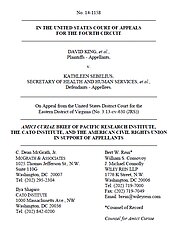Learn more about Cato’s Amicus Briefs Program.
Last month, Cato filed a brief in the D.C. Circuit case of Halbig v. Sebelius, supporting a challenge to the IRS’s unilateral and unauthorized decision to extend tax credits to individuals who purchased health insurance from exchanges that were not established by their state. Now we are continuing out advocacy in this area by filing a brief, joined by the Pacific Research Institute and the American Civil Rights Union, supporting the challengers in a similar Fourth Circuit case. Here’s the background: To encourage the purchase of health insurance, the Affordable Care Act added a number of deductions, exemptions, and penalties to the federal tax code. As might be expected from a 2,700 page law, these new tax rules have the potential to interact in unforeseen and counter-intuitive ways. As first discovered by Michael Cannon and Jonathan Adler, one of these new tax provisions, when combined with state decision-making and IRS rule-making, has given Obamacare yet another legal problem. The legislation’s Section 1311 provides a generous tax credit for anyone who buys insurance from an insurance exchange “established by the State”—as an incentive for states to create the exchanges—but only 16 states have opted to do so. In the other states, the federal government established its own exchanges, as another section of the ACA specifies. But where § 1311 only explicitly authorized a tax credit for people who buy insurance from a state exchange, the IRS issued a rule interpreting § 1311 as also applying to purchases from federal exchanges. This creative interpretation hurts individuals like David King, a 63-year-old resident of Virginia. Because buying insurance would cost King more than 8% of his income, he should be immune from Obamacare’s tax on the decision not to buy insurance (the “tax” that you’ll recall Chief Justice Roberts devised in his NFIB v. Sebelius opinion). After the IRS expanded § 1311 to subsidize people in states with federal exchanges (like Virginia), however, King could have bought health insurance for an amount low enough to again subject him to the Roberts tax. King argues that he faces these costs only because the IRS exceeded the scope of its powers. In our latest brief, we argue that the IRS’s decision wasn’t just unauthorized, it was a blatant invasion of the powers exclusively awarded to Congress in Article I of the Constitution. This error was compounded by the district court’s holding that the IRS actions were lawful because, even if Obamacare explicitly restricts the availability of tax credits to states which set up their own exchanges, the expansion of tax-credit availability serves the law’s general purpose of making healthcare more affordable. By elevating its own perception of congressional purpose over the statutory text, the district court ignored the cardinal principle that legislative intent must be effected by the words Congress uses, not the words it may have meant or should have chosen to use. In other words, if Congress wants to extend the tax credit, it can do so by passing new legislation. The only reason for executive-branch officials not to go back to Congress for clarification, and instead legislate by fiat, is to bypass the democratic process, thereby undermining constitutional separation of powers. This case ultimately isn’t about money, the wisdom of individual health care decision-making, or even political opposition to Obamacare. It’s about who gets to create the laws we live by: the democratically elected members of Congress, or the bureaucrats charged with no more than executing the laws that Congress passes and the president signs.
